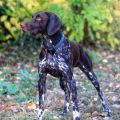The Portuguese Pointing Dog, also known as the Perdigueiro Português, is a versatile and intelligent breed that has been highly regarded for its exceptional hunting skills and loyal nature. This breed is native to Portugal and has gained popularity not only in its home country but also internationally for its remarkable abilities in the field.
The Portuguese Pointing Dog is a medium-sized breed with a well-muscled and athletic build. They have a strong and sturdy appearance, with a well-proportioned body and a deep chest. Their head is broad and slightly rounded, with a well-defined stop and a strong muzzle. The breed's eyes are expressive and usually dark brown in color, while their ears are medium-sized, set high, and drop down close to the cheeks. The Portuguese Pointing Dog has a short and dense coat that comes in various colors, including yellow, fawn, chestnut, and black.
The history of the Portuguese Pointing Dog can be traced back several centuries. It is believed that this breed descended from ancient hunting dogs brought to the Iberian Peninsula by the Phoenicians and Romans. Over time, these dogs were selectively bred by Portuguese hunters to develop the specific traits and skills required for hunting in the diverse terrains of Portugal. The breed's exceptional pointing and retrieving abilities, as well as its adaptability to different hunting environments, made it highly valued among hunters.
According to the FCI (Fédération Cynologique Internationale) typology, the Portuguese Pointing Dog belongs to Group 7: Pointing Dogs. This group includes breeds that are primarily used for pointing and retrieving game birds. Within this group, the Portuguese Pointing Dog is classified under Section 1: Continental Pointing Dogs. This section comprises breeds that originated in Europe and have similar hunting characteristics.
The Portuguese Pointing Dog is primarily bred for hunting purposes. They are highly skilled at locating and pointing game, such as birds and rabbits, using their keen sense of smell and natural instincts. Additionally, they excel at retrieving both on land and in water, making them versatile hunting companions. Their intelligence, trainability, and strong work ethic also make them suitable for various dog sports, including obedience, agility, and tracking.
In terms of size, the Portuguese Pointing Dog typically weighs between 35 to 60 pounds (16 to 27 kilograms) and stands at a height of around 20 to 24 inches (51 to 61 centimeters) at the shoulder. Their life expectancy is generally between 12 to 14 years, although with proper care and nutrition, some individuals have been known to live even longer.
One interesting fact about the Portuguese Pointing Dog is their exceptional ability to adapt to different hunting terrains. Whether it's the rugged mountains, dense forests, or marshy wetlands, these dogs can navigate and work effectively in various environments. Their webbed feet and water-resistant coat enable them to swim and retrieve game from water bodies with ease.
Another notable characteristic of this breed is their strong bond with their human companions. Portuguese Pointing Dogs are known for their loyalty, affection, and eagerness to please. They thrive on human interaction and are generally good with children and other pets when properly socialized from a young age.
In conclusion, the Portuguese Pointing Dog is a remarkable breed that combines intelligence, athleticism, and loyalty. With their exceptional hunting skills and versatile nature, they have become highly valued among hunters and dog enthusiasts alike. Whether in the field or as a loving family companion, the Portuguese Pointing Dog continues to leave a lasting impression with its remarkable abilities and endearing personality.

The Portuguese Pointing Dog, also known as the Perdigueiro Português, is a versatile and intelligent breed that possesses a unique character. These dogs are known for their exceptional hunting skills, loyalty, and affectionate nature. In this text, we will delve into the character of Portuguese Pointing Dogs, their behavior, and how to raise and train them.
The character of Portuguese Pointing Dogs can be described as friendly, gentle, and highly trainable. They are known to be excellent family companions and get along well with children and other pets. These dogs are highly sociable and thrive on human interaction. They form strong bonds with their owners and are always eager to please.
One of the defining characteristics of Portuguese Pointing Dogs is their exceptional hunting abilities. They have a strong prey drive and are natural pointers and retrievers. These dogs are highly skilled at locating and pointing out game, making them excellent hunting partners. Their intelligence and trainability make them quick learners, and they excel in various dog sports such as obedience, agility, and tracking.
When it comes to behavior, Portuguese Pointing Dogs are generally well-mannered and obedient. They are known to be calm and composed indoors, making them suitable for apartment living. However, they do require regular exercise to keep them mentally and physically stimulated. Daily walks, playtime, and interactive games are essential to prevent boredom and ensure their well-being.
To raise a Portuguese Pointing Dog, it is important to provide them with early socialization and consistent training. Exposing them to different environments, people, and animals from a young age will help them develop into well-rounded and confident dogs. Positive reinforcement training methods work best with this breed, as they respond well to praise, treats, and rewards.
Training Portuguese Pointing Dogs should focus on their natural instincts and abilities. Teaching them basic obedience commands such as sit, stay, and recall is crucial for their safety and control. Additionally, introducing them to scent work and retrieving exercises will help channel their hunting instincts in a positive way.
It is important to note that Portuguese Pointing Dogs thrive on human companionship and can become anxious or destructive if left alone for long periods. They are not suited for households where they will be left alone for extended periods of time. They require a loving and active family who can provide them with the attention and exercise they need.
In conclusion, Portuguese Pointing Dogs are intelligent, loyal, and versatile companions. Their friendly and gentle nature, combined with their exceptional hunting skills, make them a popular choice for dog enthusiasts. With proper socialization, training, and plenty of exercise, these dogs can thrive in various environments and make wonderful additions to any family.
The Portuguese Pointing Dog, also known as the Perdigueiro Português, is a versatile and intelligent breed that requires specific care to ensure their well-being and happiness. Here are some tips on how to care for dogs of this breed, including what to do and what not to do:
1. Exercise: Portuguese Pointing Dogs are active and energetic, requiring regular exercise to keep them physically and mentally stimulated. Aim for at least 60-90 minutes of exercise daily, including walks, runs, and playtime in a secure area. Engaging them in activities like retrieving or agility training can also be beneficial.
2. Mental Stimulation: These dogs are highly intelligent and thrive on mental challenges. Provide them with puzzle toys, interactive games, and obedience training sessions to keep their minds sharp. Failure to provide adequate mental stimulation can lead to boredom and destructive behavior.
3. Socialization: Early and ongoing socialization is crucial for Portuguese Pointing Dogs. Expose them to various people, animals, and environments from a young age to ensure they grow up to be well-rounded and confident dogs. Regular visits to dog parks, training classes, and outings are recommended.
4. Grooming: The breed's short, dense coat requires minimal grooming. Regular brushing with a soft-bristle brush will help remove loose hair and keep their coat in good condition. Bathing should be done only when necessary to avoid stripping the natural oils from their skin. Additionally, check their ears regularly for signs of infection and trim their nails as needed.
5. Nutrition: Provide a balanced and high-quality diet that meets the nutritional needs of Portuguese Pointing Dogs. Consult with a veterinarian to determine the appropriate portion sizes and feeding schedule based on their age, size, and activity level. Avoid overfeeding, as this breed is prone to obesity.
6. Health Care: Regular veterinary check-ups are essential to monitor the overall health of your Portuguese Pointing Dog. Vaccinations, parasite prevention, and dental care should be part of their routine healthcare. Additionally, be aware of breed-specific health concerns such as hip dysplasia and progressive retinal atrophy (PRA), and discuss these with your vet.
7. Positive Reinforcement: Portuguese Pointing Dogs respond well to positive reinforcement training methods. Use rewards, such as treats, praise, and play, to motivate and encourage good behavior. Avoid harsh training techniques or punishment, as it can damage their sensitive nature and hinder their progress.
8. Secure Fencing: These dogs have a strong prey drive and an instinct to roam. Ensure your yard is securely fenced to prevent them from escaping and getting into trouble. Supervise them during outdoor activities to avoid chasing wildlife or straying too far.
9. Family Time: Portuguese Pointing Dogs are highly sociable and thrive on human companionship. They are not suited for long periods of isolation or being left alone for extended periods. Make sure to spend quality time with your dog, including regular play sessions, training, and cuddling.
10. Avoid Excessive Heat or Cold: Due to their short coat, Portuguese Pointing Dogs are sensitive to extreme temperatures. Protect them from excessive heat by providing shade, fresh water, and avoiding strenuous exercise during the hottest parts of the day. In colder climates, provide them with a warm and comfortable shelter or clothing when necessary.
Remember, each dog is an individual, and their care may vary slightly. Always consult with a reputable breeder or veterinarian for specific advice tailored to your Portuguese Pointing Dog's needs. With proper care, love, and attention, your Portuguese Pointing Dog will be a loyal and cherished companion for many years to come.
The Portuguese Pointing Dog, also known as the Perdigueiro Português, is a versatile and intelligent breed that is highly regarded for its exceptional hunting skills and loyal nature. When it comes to their appearance, these dogs exhibit a range of colors, each possessing its own unique charm. However, there is a common color that is often associated with the Portuguese Pointing Dog.
The most prevalent color seen in Portuguese Pointing Dogs is a rich and warm shade of chestnut brown. This color is often described as a deep, earthy tone that exudes elegance and sophistication. The coat of these dogs is typically dense and glossy, adding to the overall allure of their color.
The chestnut brown color of the Portuguese Pointing Dog's coat is often accompanied by various shades and patterns, further enhancing their visual appeal. Some dogs may have a slightly lighter or darker variation of the chestnut brown, creating a subtle gradient effect. This adds depth and dimension to their coat, making them even more striking.
In addition to the base color, Portuguese Pointing Dogs may also have markings or patterns that complement their chestnut brown coat. These markings can vary from small patches of white on the chest, paws, or tail tip, to larger areas of white on the face or body. These white markings create a beautiful contrast against the rich brown, giving the dogs a distinctive and eye-catching appearance.
It is worth noting that while chestnut brown is the most common color seen in Portuguese Pointing Dogs, there are other acceptable colors within the breed standard. These include solid black, solid yellow, and a combination of black and white. However, it is the chestnut brown color that is often associated with this breed and is most frequently seen.
The color of a Portuguese Pointing Dog's coat not only adds to their aesthetic appeal but also reflects their natural environment. The warm, earthy tones of their chestnut brown coat blend harmoniously with the Portuguese countryside, where they were originally bred to hunt and work alongside their human companions.
In conclusion, the common color of Portuguese Pointing Dogs is a rich and warm chestnut brown. This color, often accompanied by various shades and patterns, creates a visually striking appearance that is both elegant and captivating. Whether they are working in the field or simply being a loyal family companion, the Portuguese Pointing Dog's coat color is a testament to their beauty and versatility.
The Portuguese Pointing Dog, also known as the Perdigueiro Português, is a versatile and athletic breed known for its excellent hunting skills and loyal nature. When it comes to their health, Portuguese Pointing Dogs are generally considered to be a robust and healthy breed. However, like any other dog breed, they are prone to certain health issues that owners should be aware of to ensure their well-being.
One of the most common health concerns in Portuguese Pointing Dogs is hip dysplasia. This condition occurs when the hip joint doesn't develop properly, leading to discomfort, pain, and eventually arthritis. Regular exercise, a balanced diet, and maintaining a healthy weight can help reduce the risk of hip dysplasia. Additionally, responsible breeders should perform hip evaluations on their breeding dogs to minimize the occurrence of this condition in future generations.
Another health issue that can affect Portuguese Pointing Dogs is progressive retinal atrophy (PRA). PRA is a degenerative eye disease that leads to gradual vision loss and, in severe cases, blindness. Regular eye examinations by a veterinary ophthalmologist can help detect PRA early on, allowing for appropriate management and care. Responsible breeders should also test their breeding dogs for PRA to prevent passing on this genetic condition.
Portuguese Pointing Dogs are also prone to certain skin conditions, including allergies and dermatitis. These can be caused by various factors such as food allergies, environmental allergens, or parasites. Regular grooming, including brushing their coat and checking for any signs of skin irritation, can help prevent and manage these conditions. If allergies are suspected, working with a veterinarian to identify and eliminate the allergen from the dog's environment or diet is crucial.
Additionally, Portuguese Pointing Dogs may be susceptible to certain heart conditions, such as dilated cardiomyopathy (DCM). DCM is a disease that affects the heart muscle, leading to its enlargement and reduced ability to pump blood effectively. Regular veterinary check-ups, including cardiac evaluations, can help detect and manage DCM early on. A heart-healthy diet and regular exercise can also contribute to maintaining good cardiovascular health.
To ensure the overall health and well-being of Portuguese Pointing Dogs, it is essential to provide them with a balanced diet that meets their nutritional needs. Regular exercise is also crucial to keep them physically fit and mentally stimulated. Routine veterinary check-ups, vaccinations, and preventive care, including parasite control, are essential to detect and address any health issues promptly.
Furthermore, responsible breeding practices play a vital role in maintaining the health of the breed. Reputable breeders should conduct health screenings on their breeding dogs to minimize the risk of passing on genetic diseases. Potential owners should seek out breeders who prioritize the health and well-being of their dogs and provide proper documentation of health clearances.
In conclusion, Portuguese Pointing Dogs are generally a healthy breed, but they can be prone to certain health issues like hip dysplasia, PRA, skin conditions, and heart diseases. Regular veterinary care, a balanced diet, exercise, and responsible breeding practices are key to ensuring the health and longevity of these loyal and versatile dogs.
The Portuguese Pointing Dog, also known as the Perdigueiro Português, is a versatile and active breed that requires a well-balanced and nutritious diet to maintain optimal health and performance. Proper nutrition plays a crucial role in their overall well-being, energy levels, and longevity. In this text, we will provide an extensive description of the nutrition requirements for Portuguese Pointing Dogs, along with advice on feeding and what to avoid.
First and foremost, it is important to choose a high-quality dog food that is specifically formulated for active breeds. Look for a product that contains real meat as the primary ingredient, as this will provide the necessary protein for muscle development and maintenance. Avoid foods that list meat by-products or fillers as the main ingredients, as these may not provide the essential nutrients your dog needs.
Protein is a vital component of a Portuguese Pointing Dog's diet, as it aids in muscle growth, repair, and overall development. Aim for a diet that contains around 25-30% protein. Good sources of protein include chicken, turkey, beef, and fish. If you prefer to feed your dog a raw or homemade diet, consult with a veterinarian or canine nutritionist to ensure that it meets all the necessary nutritional requirements.
In addition to protein, Portuguese Pointing Dogs require a moderate amount of healthy fats in their diet. Fats provide a concentrated source of energy and are essential for the absorption of fat-soluble vitamins. Look for dog foods that contain omega-3 and omega-6 fatty acids, which promote healthy skin and coat. Fish oil and flaxseed are excellent sources of these essential fatty acids.
Carbohydrates are another important component of a Portuguese Pointing Dog's diet, providing energy for their active lifestyle. Opt for complex carbohydrates such as whole grains, sweet potatoes, and brown rice, as they release energy slowly and help maintain stable blood sugar levels. Avoid foods that contain excessive amounts of corn, wheat, or soy, as these can cause allergies or digestive issues in some dogs.
Fruits and vegetables should also be included in your Portuguese Pointing Dog's diet. They provide essential vitamins, minerals, and antioxidants that support overall health and boost the immune system. Some safe options include carrots, broccoli, blueberries, and apples. However, be cautious with certain fruits like grapes and raisins, as they can be toxic to dogs.
Feeding guidelines for Portuguese Pointing Dogs may vary depending on their age, weight, activity level, and overall health. It is recommended to divide their daily food intake into two or three meals to prevent bloating and aid digestion. Monitor your dog's weight and adjust the portion sizes accordingly to maintain a healthy body condition.
Lastly, it is crucial to provide fresh and clean water at all times. Hydration is essential for proper digestion, nutrient absorption, and overall well-being. Make sure to clean your dog's water bowl regularly to prevent bacterial growth.
In conclusion, a well-balanced and nutritious diet is vital for the health and vitality of Portuguese Pointing Dogs. Choose a high-quality dog food that contains real meat, adequate protein, healthy fats, complex carbohydrates, and a variety of fruits and vegetables. Avoid foods with low-quality ingredients, excessive fillers, and potential allergens. Remember to consult with a veterinarian or canine nutritionist for personalized advice and to ensure that your dog's nutritional needs are met.





